JUNIOR SCHOOL HANDBOOK





Welcome to Ballarat Grammar, a school that celebrates the journey of children becoming fine young men and women. In partnership with you, we aim to develop graduates who are poised to make a significant positive difference to their world. We share your aspiration, as parents, for our young people to grow as happy, healthy and well- rounded individuals.
Our focus is on the development of the whole child. We support students to develop a genuine belief in service just as much as we nurture them to achieve outstanding academic results that create opportunities in the future.
It is no secret that happy, balanced children thrive at school and in life. We provide the broadest range of opportunities to allow your children to develop, articulate and live up to a set of beliefs that will serve them invaluably in the future.
Grammar is renowned for its wellbeing program, equipping our students with the skills and decision- making abilities to make the most of life’s opportunities and show resilience in the face of future challenges. Our dedicated teachers, coaches and team of support staff are deeply committed to your children’s progress and will work closely with you to support them to thrive.
We recognise the powerful combination of learning both in and beyond the classroom. Developing tenacity through conquering an outdoor challenge, mastering an algebraic equation and teaching reading skills to younger disadvantaged children sit equally amongst our understanding of priorities in developing good, successful young people.
Our students will live, work in, trade with and experience a greater variety of different cultures than any previous generation. We prepare students for a life of international connection, partly through our membership of the Round Square organisation, which partners our school to 180 others globally through exchange programs, student conferences and service projects.
Our innovative focus at Grammar nurtures creativity, through a strong arts program, as well as every learning experience. This focus instils in students a curiosity to look for solutions beyond the conventional. Whilst we enjoy first class educational facilities and spacious campuses, the heart of Ballarat Grammar is our community.
You will not find people more passionate or committed to creating the best possible learning environment and future opportunities for your children, as well as a strong sense of belonging for students and their families.
Adam Heath, Headmaster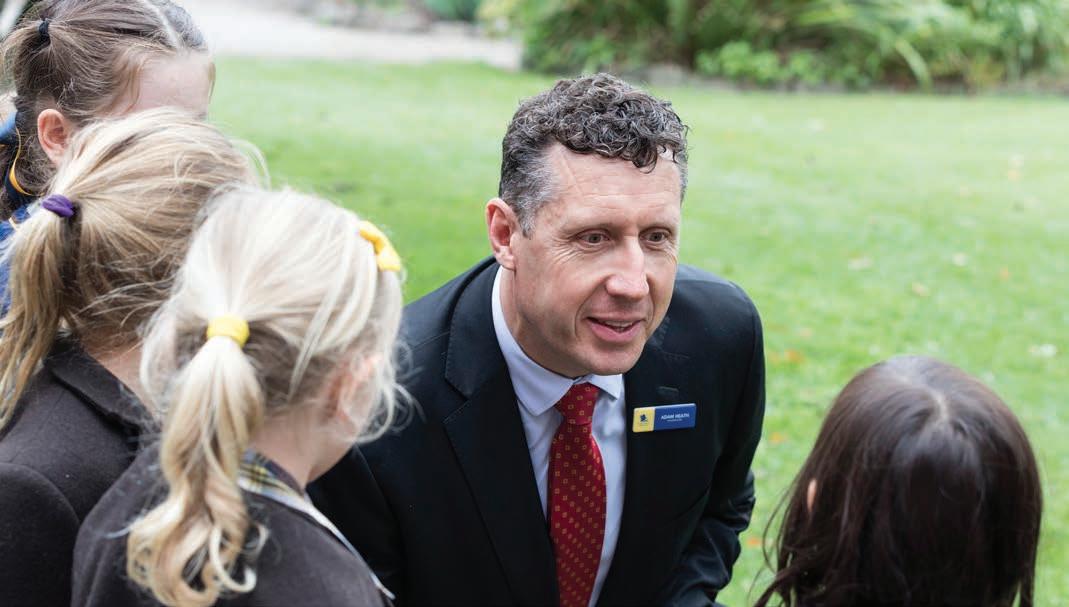
“If change is, indeed, the new constant, then the ability to adapt and transform in new situations is ever more important”.
HEAD OFFICE
Junior School Office
School Phone
Admissions Office
Junior School Email
Feedback
DEPARTMENT HEADS
Head of Junior School
Mr Mark Warwick
Headmaster
Mr Adam Heath
Director of Admissions
Mr Bruce Pipkorn
03 5 338 0846
03 5 338 0700
03 5 338 0830
js@bgs.vic.edu.au
feedback@bgs.vic.edu.au
Website Ins tagram
Tw itter
www.bgs.vic.edu.au
@ballaratgrammar
facebook.com/BallaratGrammar
twitter.com/ballaratgrammar
linkedin.com/ballaratgrammar
headofjs@bgs.vic.edu.au
headmaster@bgs.vic.edu.au
admissions@bgs.vic.edu.au
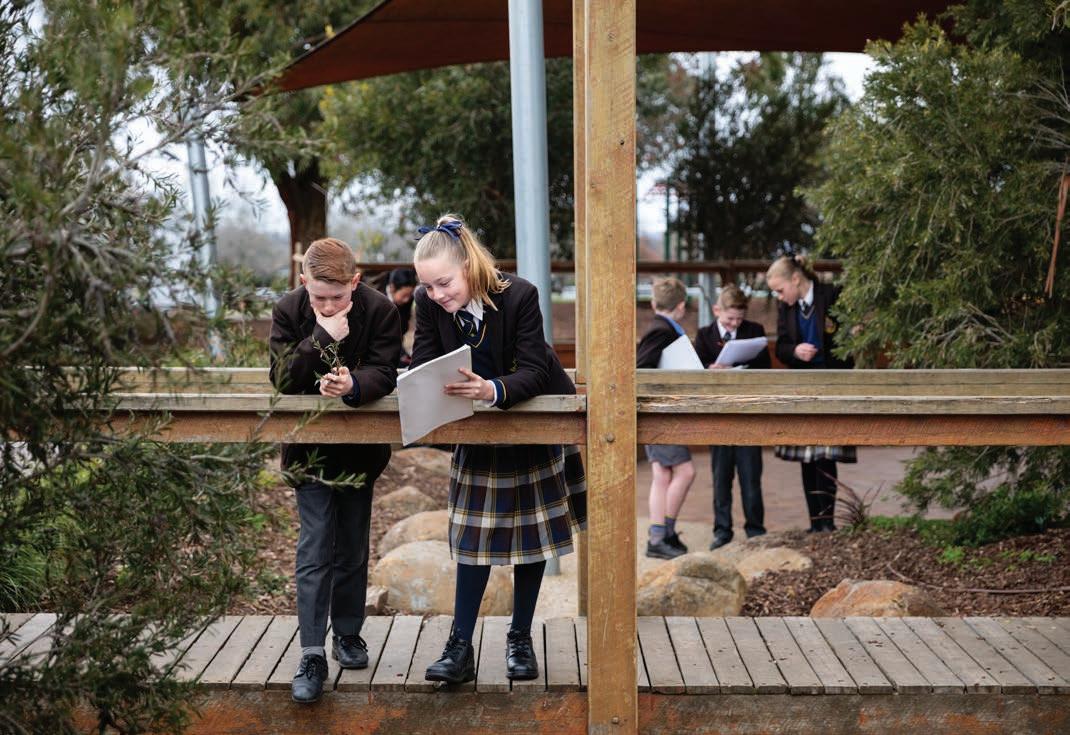
We would like to extend to you a warm welcome to the Ballarat Grammar Junior School community.
The Junior School is committed to the overall development of the individual child, with a particular mission to establish sound levels of literacy and numeracy. Our programs are developed to encourage all children to maximise their potential.
In 2015 the Junior School was authorised as an International Baccalaureate (IB) World School offering the Primary Years Program (PYP). We undertook our 5 year evaluation in 2019, with many commendations.
In addition to our excellent academic and co-curricular programs, we are extremely proud of the “Grammar Culture” which pervades everything we do – an inclusive, caring, tolerant and courageous approach to life which the students display on a daily basis.
The School’s commitment to student wellbeing is reflected through our use of restorative practices and the linking of wellbeing with our Life and Faith curriculum.
In catering for the whole child, our explicit teachings are underpinned by the science and current research of Positive Psychology.
Our arts program provides students with many opportunities to develop into confident performers through weekly visual art, music, and dance and drama classes, culminating in performances such as the Gala Concert, in Wakakirri, our end of year Production, and participation in our Art Exhibition. Along with the option of individual music lessons, there are many and varied opportunities for our students.
The Physical and Outdoor Education programs are also a feature of our School and provide challenges for all children. A wide variety of sport is played, with emphasis on teamwork, sportsmanship and the pleasures of participation and achievement. A “personal best” philosophy applies to all endeavours.
We all take a great deal of pride in the “family” atmosphere of our School. Parent involvement in the School is encouraged and communication between the School and home is actively fostered. I am always happy to have a discussion should you wish to discuss any aspects of Junior School life. This handbook will assist you in answering many of the day-to-day queries regarding the operation of the Junior School. If you have further questions, please do not hesitate to telephone the Junior School for assistance.
With all good wishes for a long and happy association with our School.
Mark Warwick Head of Junior School and Co-Deputy Head of School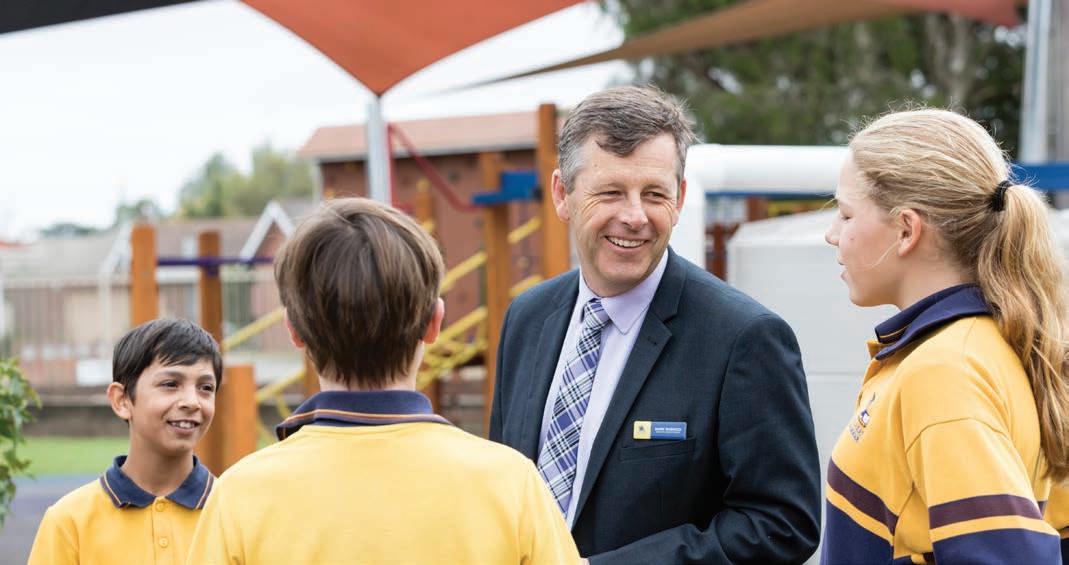
“Students work towards building a strong foundation of skills that aim at developing resilience, optimism and the necessary strategies needed to deal with the social and emotional challenges that arise throughout life”.
Today’s Ballarat and Queen’s Anglican Grammar School has its origins in two older schools.
The Queen’s College for Young Ladies was opened in Dana Street, Ballarat in the mid 1870’s. Its first Principal was Mrs Matilda Dixie. In common with many schools in the late 19th century, the School changed its location many times until, in 1918, it finally settled at 1200 Mair Street. In that same year, Queen’s was transferred to the Diocese of Ballarat and became the Ballarat Church of England Girls’ Grammar School. “Queen’s” was restored to the name of the School in 1935, and so Queen’s Church of England Girls’ Grammar School continued for more than 35 years.
Ballarat Grammar School for boys was opened in Forest Street, Wendouree, on 14 February 1911. Its first Headmaster was Dr PA Robin and there were 38 pupils. As the years passed, the School expanded and the number of pupils increased, but unlike the girls’ school, the boys’ school remained on the same campus.
In 1973, a co-educational school had been established on the 14 hectare Wendouree site, where there was ample room for amalgamation and expansion.
The two schools became one, Ballarat and Queen’s Anglican Grammar School. Ballarat Grammar now caters for over 1500 students, from Reception to Year 12, girls and boys, day students and boarders.
Both Queen’s and Ballarat Grammar School ran small Junior Schools and the tradition continues at Ballarat Grammar. Mr IC Brown was Junior School Headmaster from 1963 until 1977. The present Junior School building was opened on 14 September 1980, by the Prime Minister of Australia, the Rt Hon Malcolm Fraser, and was blessed by Bishop John Hazelwood, Seventh Bishop of Ballarat. In 1999, the School expanded to include a new, purpose built Early Learning Centre for pre-school aged children. This was expanded and completely rebuilt in 2012 as the Centre for Early Education (CEEd) – catering for four year old Kindergarten, three year old Reception, 0 – 36 month Child Care and After Care in the magnificent new Norman St facility.
Carn Brae 1 and Carn Brae 2 were opened during the early 2000s. Whole school facilities, the Wendouree Centre for the Performing Arts and the Rintel Centre (Physical Education) have provided additional opportunities in recent years.
Between 2012 & 2014, the main Junior School building was extensively renovated and re-developed to include shared learning spaces and the new Inquiry Centre. In 2014 the new Mount Rowan Campus began operation, housing the Stephen and Sue Higgs Centre, focusing on place-based learning and the home of our Year 4 students.
In 1996 the School became a member of the International Round Square organisation and in 2015 successfully gained authorisation as an IB World School, offering the PYP from
Prep to Year 6. The Junior School now accommodates students in with newly developed classrooms and playground completed in 2017, and a state of the art learning centre established for years 5 and 6 students in 2022.
Ballarat and Queen’s Anglican Grammar School fosters the pursuit of excellence by providing its students with a broad liberal education of the highest quality, in the Anglican tradition.
Ballarat Grammar aims to empower its students with:
•understanding of, and learning from, Christian faith and Christian spirituality.
•academic confidence, and a passion for learning.
•an understanding of the obligations of community both local, and international.
•social competence, and the capacity for leadership.
•a desire for involvement in the arts, sports and co-curricular activities.
•good physical and emotional health.
The School aims to provide for staff:
•a safe, supportive and challenging professional environment.
•strategic professional development and career promotion.
•advanced facilities and teaching technologies
The School expects of staff:
•the highest professional standards and a commitment to professional growth.
•personal and professional conduct which reflects the values of the School.
The School aims to give parents the assurance that their young people are:
•being properly valued and protected.
•being appropriately challenged and extended.
The activities of the School are carried out through a partnership involving students, staff, and parents, in a happy and nurturing community which embraces diversity and change. More detail on the expectations of this partnership can be found in the Parents’ Charter, on the Parent section of NEXUS.
In the Junior School at Ballarat Grammar we work hard, try new things and always aim to be our best. We are friendly and make sure everyone feels like they belong in the school, we are a community of learners and we are respectful of each other and our environment.
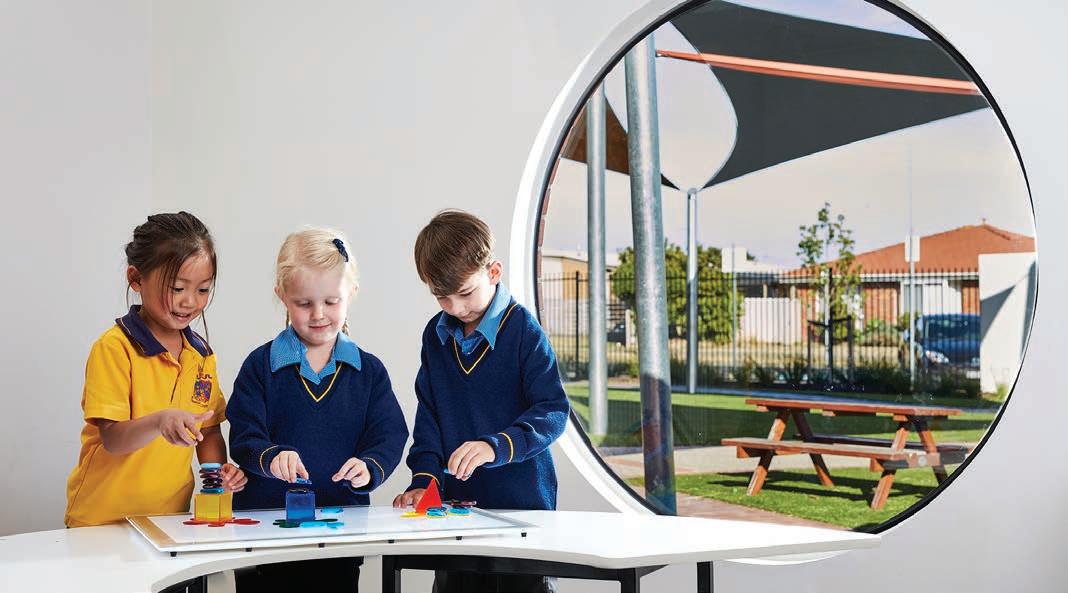
We approach life with a positive mindset, engaging with our peers and our teachers in ways which maximise both accomplishment and relationships. We make principled decisions, show courage in our actions and always reflect on what we have done. We inquire about the things we don’t understand and don’t expect to be handed all the answers. We respect the views of others even when they are different to our own.
We commit to solving problems by listening to the feelings of those who are hurt so as to determine what actions we can take to make things better. When we are hurt or upset we focus on what needs to happen to make things right. We know that together we can develop inquiring, knowledgeable and caring young people who will work to make a better world.
For the start of each year the Junior School students and staff will work together to refine the commitment described above as a set of Essential Agreements which will guide our community for the next 12 months.
Any incident involving unacceptable student behaviour in class will initially be handled by the class teacher concerned. If a student’s behaviour does not improve then further action will be taken. At all times the Junior School employs a restorative approach to behavioural matters. The key to success in this area is open communication, trust and positive relationships. If at any time a parent is concerned about such matters they should make contact with the class teacher or the Head of Junior School.
Everyone makes mistakes. The important thing is to learn from mistakes and to be genuinely committed to avoiding them in the future. To enjoy the rights of being a member of the Grammar community, students must accept the responsibilities and abide by the expectations and rules of the School.
These agreements were developed by Junior School students and staff. They will be revisited each year and circulated to all in our community.
In the Junior School at Ballarat Grammar:
•We work hard, try new things and “be our best”.
•We are friendly and make sure everyone feels like they belong in the school.
•We are a community of learners.
•We are respectful of each other and our environment.
At Ballarat Grammar Junior School, the Australian Curriculum together with the International Baccalaureate Primary Years Program (IB PYP) curriculum framework, provides the basis for all areas of learning.

The overall aim of staff in the Junior School is to create a supportive, caring and challenging environment where students are actively engaged in meaningful learning, teaching is focused and expectations of student achievement are high. The Junior School’s Positive Education program helps students to develop strategies to independently deal with social and emotional situations.
The Junior School has a close relationship with the Centre for Early Education (CEEd) which enables a smooth transition into Prep. Junior School staff collaborate with their colleagues in the CEEd, Middle and Senior Schools to ensure sharing of resources, clear learning pathways and common expectations.
Teaching methods are many and varied to allow for the variety of individual learning styles. Staff members aim to adopt teaching strategies designed to maximise each student’s progress towards identifiable goals. The students are encouraged to develop respect for, and trust in, the staff members. They develop understanding of differing viewpoints, not only sharing their own ideas but listening to the ideas of others.
The rigour of the IB PYP ensures that the curriculum is continually reviewed to ensure that it meets the needs of our students. Each year a Program of Inquiry (PoI) is developed with six Units of Inquiry per year level that form the basis of teaching and learning. Traditional curriculum areas such as Science, History, Geography, Health, and the Arts, are taught through the PoI and are relevant and meaningful, along with explicit teaching of English and Maths. Knowledge, understanding and skills that do not align with Units of Inquiry are taught as stand-alone units. For further information about the IB and its programs, visit www.ibo.org
The curriculum from Prep to Year 6 is underpinned by an structured inquiry methodology. Explicit teaching of key concepts and structured inquiry are at the heart of our programs. Traditional subject areas are explored through a transdisciplinary approach that focuses on developing internationally minded students. We strongly believe that 21st century learners need to be provided with transferable skills for their future as global citizens. Differentiation occurs at all year levels with support and enrichment opportunities provided.
Assessment information is used to design programs, which will challenge and stimulate children in their learning as well as provide the necessary time and support for children to develop core academic skills.
The transition to Middle School is carefully managed, with pastoral care and student wellbeing of paramount importance. House and Class groupings are decided through collaborative dialogue between Junior, Middle and Senior Schools.
Environmental sustainability is central to the way we live, learn and evolve as a community. We believe that fostering a respect and appreciation for the natural world and environment amongst the staff, students, families, and wider community is critical. We look towards best practice, ensuring that environmental sustainability is at the forefront of our minds in everything we do. Our curriculum reflects the necessary thinking required for a sustainable future and is an important dimension of the Australian Curriculum and the IB PYP
Students participate in a variety of activities that evolve from the following areas:
Waste Smart: The reduction of litter within the School grounds through student led initiatives and Environmental Committee is a popular activity. Students are encouraged to bring rubbish free lunches to School in clearly named containers or reusable packaging. It is important that we take responsibility for the rubbish we generate.
Energy Smart: Conserving energy and saving on energy costs through student and staff actions. Students and staff ensure that lighting, computers and other technologies are turned off when not in use. Our School is currently generating over 640Kwh of alternative energy.
Biodiversity Smart: The protection and enhancement of biodiversity within our local and global environment. Students participate in a variety of related activities and special days including lunchtime gardening.
Community Smart: Communities working together sustains life on Earth. Under this theme, our students take part in a range of extracurricular activities including community clean ups.
Being literate and numerate is central to the development of all young people. Our English and Mathematics programs emphasise the importance of knowledge, skills and understandings.
The English curriculum recognises the importance of understanding and applying language in a variety of texts and media forms while encouraging and fostering the appreciation and enjoyment of English in all those forms. In developing our English curriculum the Junior School has used the Australian Curriculum as a tool and guide to forming a comprehensive curriculum to cater for the needs of all students.
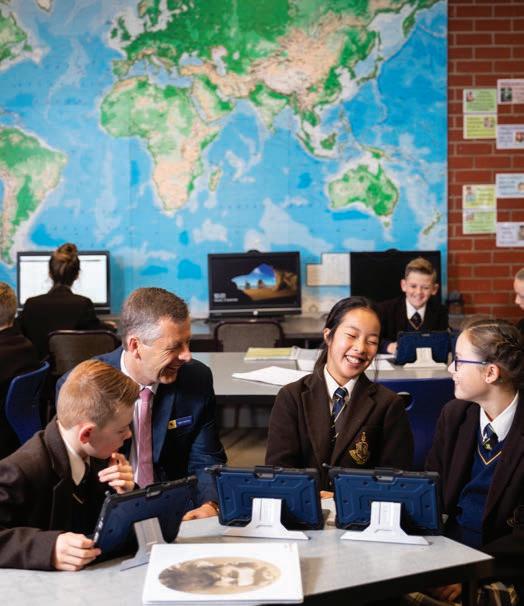
The three strands of language, literature and literacy are interwoven and inform and support each other.
Language: Students develop their knowledge about the English language and how it works. They learn about patterns of English usage and grammar at the levels of the word, the sentence and the extended text, and they learn the connections between these levels. They learn about spelling and the purposes of punctuation.
Students understand that developing an explicit body of knowledge of how language works in these ways helps them communicate effectively through coherent, well- structured sentences and texts.
Literature: Students learn to interpret, appreciate, evaluate and create literary texts such as narrative, poetry, prose, plays, film and multimodal texts, in spoken, print and digital/online contexts.
Literacy : Students apply their English skills and knowledge to listen to, view, read, speak, write and create a growing repertoire of texts. They learn to comprehend, interpret and create spoken, written and multimodal texts, and use the English language accurately, fluently, critically, creatively and confidently.
Educational experiences have real life relevance, purpose and address a range of learning styles. The teaching and learning program is designed to help children develop an understanding of concepts that develop skills to form the foundation of future learning.
Students are given the scaffolding and opportunities, through various teaching strategies, to express themselves appropriately in different literacy situations. Enrichment, Intervention and Support classes are conducted at various year levels to provide additional opportunities and/or support, ensuring that each student is developing to their potential.
A comprehensive Reading Intervention program occurs in Year 1. In other levels of the Junior School the English Co- ordinator works closely with teachers to attend to the needs of all students, particularly those making slower progress. This assistance is usually provided by the English Co-ordinator working in classrooms with the class teacher. In addition, Teacher Assistants are also used for extra support in classes where students have special needs.
Mathematics in Prep to Year 6 aims to provide students with essential mathematical skills, knowledge and understanding in Number and Algebra, Measurement and Geometry, and Statistics and Probability. We work hard to continually refine our approach to Mathematics learning and teaching with our primary objective being to provide students with mathematical capabilities that can be used in their lives beyond school.
Learning in Mathematics involves students constructing meaning, transferring meaning and applying with understanding. To facilitate this, students are provided with opportunities to learn through hands-on activities relevant to everyday life, rich and authentic tasks that promote problem solving and mathematical reasoning, targeted games, the effective use of technology and skills practice. Junior School staff aim to instil an appreciation of the power of Mathematics while also encouraging children to view the subject area as fun and engaging. They support students to develop a growth mindset and provide them with the skills needed to take responsibility for their learning.
Enrichment opportunities are made available in a variety of forms, including externally-based competitions and challenges, and individual and group mathematical inquiries.
Mathematics support is also provided in numerous ways to address individual learning needs and enable students to enhance their fundamental number sense. The Numeracy Intervention Program focuses on students in the early years of schooling who require intensive support.
In the Junior School at Ballarat Grammar, studies in Dance and Drama are an integral part of the Arts program. All students are given the opportunity to explore both programs in our fully equipped specialist Dance and Drama performance space.
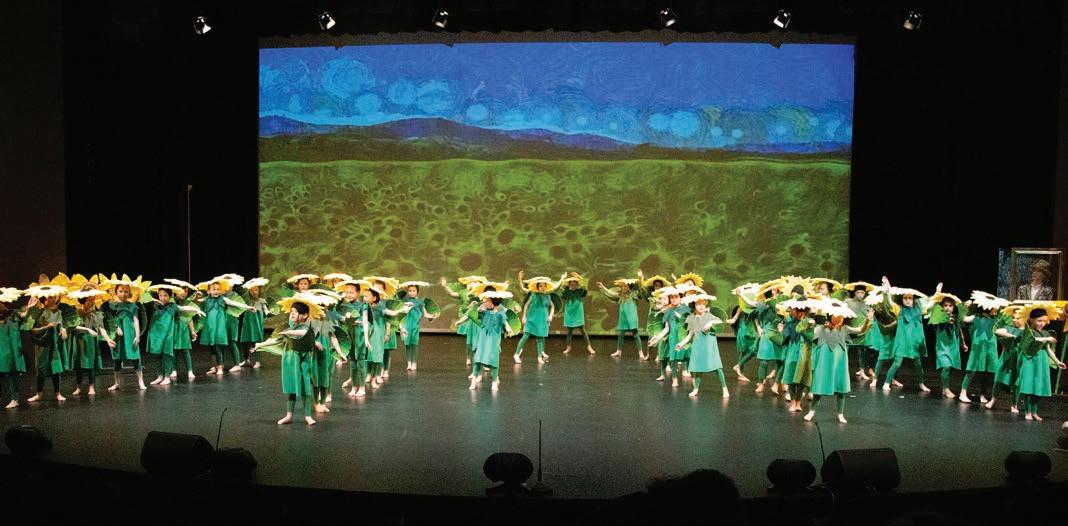
Experiences for students in Dance include using the body to communicate and express meaning through purposeful movement. Dance practice integrates choreography, performance, appreciation of and responses to dance and dance making.
In Drama, students explore and depict real and fictional worlds through the use of body language, gesture and space. They learn to make meaning as performers and audience members as they create, rehearse, perform and respond to different styles of drama.
The end of year theatrical Junior School Production, in which all students participate, provides a unique and important performance opportunity for students to apply and showcase their learning and abilities in Dance and Drama.
Classroom music is delivered using Kodaly and Orff philosophies, through listening, singing, dancing, creating and performing.
Year 2 children are introduced to group string tuition on violin, viola or cello as part of our Year 2 Strings Program. The learning of an instrument that children haven't learnt before, is a crucial part of developing the whole child at Ballarat Grammar.
Co-curricular choirs and ensembles include Earlybirds Choir (Prep-3), Year 5/6 Choir, Year 4 Choir Singbiosis, Bright Sparks -
an auditioned Year 2 to 6 Choir, Viva Voce, Junior Strings, Middle Strings, Bangers ‘n Smash, Training Band and Guitar Ensemble.
Students are encouraged to participate in the ensemble and choral programs. Age-appropriate instrumental concerts provide young musicians with performance opportunities. Assemblies, Gala Concert and the School Production also provide further opportunities for participation.
The Visual Arts program at Ballarat Grammar enables all students in the Junior School from Prep to Year 6 to learn through and about Visual Arts in a specialised Art space.
Students explore conceptual understandings and experiment with representational skills across a broad range of arts practices including: Drawing, Painting, Printmaking, Ceramics, Sculpture and Textiles.
The Visual Arts curriculum strives to nurture students’ aesthetic, creative, imaginative and critical capacity. This is achieved through independent arts inquiries and in alignment with year level Units of Inquiry.
Students engage in the creative process and respond to arts through a variety of historical, social and cultural perspectives to enrich individual and collaborative opportunities for learning, creating and expression.
An annual Junior School Art Exhibition (including artworks from children in the Centre for Early Education) is held in the Beckworth Centre for the Arts each year, providing each student with the opportunity to share and celebrate their creative efforts with the wider school community.
In the Junior School, we use a variety of media including iPads, tablets, touch screen devices, desktop computers, and digital cameras.
The area of Inclusive Education seeks to identify and support students with additional needs in reaching their learning potential. This can be achieved in a variety of ways according to individual requirements. Goals are set via a collaborative process with those responsible for the student, and an appropriate educational plan is agreed upon. This process is managed by the Inclusive Education Co-ordinator to ensure best outcomes for students.
The area of Learning Enrichment seeks to identify and support students able to operate at higher levels than those they are normally exposed to in mainstream classes. Learning Enrichment is generally provided at Years 4 and 6 with a particular focus on Mathematics and English. Whilst the form of the Enrichment offering varies from year to year, the aim is generally to add to the learning occurring in normal classes rather than to replace it.
Junior School students receive instruction in French and have the opportunity to pursue advanced French once they reach the Middle School (Latin and Chinese are also offered) Timetabled formal French classes are introduced from Year 2 and all students are immersed in the French language from Prep. It is recognised that the learning of another language greatly enhances a student’s conceptual and cognitive development and also promotes a greater understanding of associated cultural traditions.
The Physical Education program aims to develop knowledge and fundamental motor skills in the areas of Movement (Gymnastics), Ball Skills, Aquatics and Major Games.
There is a sequential program from Prep to Year 6, all activities being based on development of gross and fine motor skills, social interaction and awareness of fitness levels. There is little emphasis on competition-based learning, but modified games may be used to further the development of skills in a game situation.
Students participate in activities such as swimming, throwing/ catching, movement to music, outdoor winter skills, striking skills, athletics training and co-ordination tasks.
Middle and Senior School staff liaise closely with Junior School staff, providing assistance and specialist teaching. Wherever possible, outstanding sportsmen and women are invited to share their experiences with students, taking specialist clinics and acting as role models for the children.
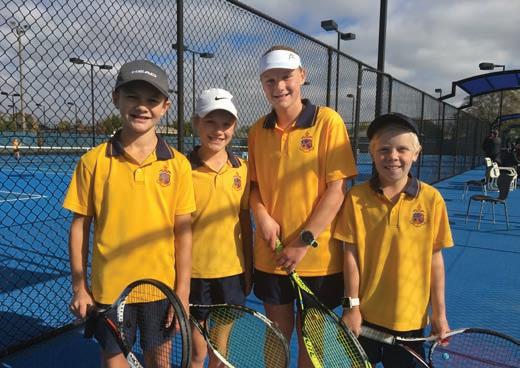
Children should wear Sports uniform on days where PE classes are timetabled or when they have been selected for inter-school events.
Students are expected to take part in weekly Physical Education lessons and Sport. If a student is unable to participate, the School expects written advice from the parent to that effect (a note in the Study Planner or an email would be ideal).
Parents are requested to advise the School early in the morning should their child be absent on any day. A phone call, email to absences@bgs.vic.edu.au or please complete the absences section on NEXUS. Legally we need to be provided with an explanation by a parent for any absence by a student.
In the case of prolonged absences, parents are requested to complete a Request for Leave Form which can be located on the Junior School Nexus page or at the Junior School Office.
As far as possible, medical and dental appointments should be made out of school hours. If a child is taken from the School for any reason during the day, it would be appreciated if the class teacher is notified. A note in the Study Planner or an email is the most appropriate method of notifying the School. Where no advice is received regarding a child’s absence, the attendance roll will be marked as “kept at home”. It remains a legal requirement for children to regularly attend school between the ages of 6 -16. In line with other legal requirements, a parent needs to sign their child in and out at the Junior School office out of normal arrival/ departure times
Camp Australia conduct an authorised OSHC Program between 3:40pm and 6:00pm each day of the term and Vacation Care is provided during at least 7 weeks of the holidays. Details of the OSHC programs, including Vacation Care dates, can be obtained from the Junior School Office, or via the Camp Australia website www.campaustralia.com.au Government rebates may be available to parents.
The School operates a comprehensive After School Activities Program each term. The sports and activities on offer are determined by the Junior School Sports Co-ordinator in liaison with the Head of the Junior School, the Director of Sport and individual Junior School teachers. The list of activities for a term will be determined and confirmed before the end of the preceding term. Parents and children are then able to select their sport/ activity. Places in activities are generally determined by order of selection (first in) until all places are taken. Every effort is made to accommodate all those wishing to choose an activity although this is not always possible. In some cases a minimum standard is required for a sport or there may be a selection process based on merit. Sports/activities generally DO NOT run during the first or last weeks of term. Training sessions generally run from 3:45pm until 4:45pm although other arrangements are sometimes made. These will always be clearly communicated to parents, children and the Junior School Secretary.
Students should always be collected promptly at the end of the activity
1.Hair below shoulder length is to be tied back with a school ribbon. These may be any of the School colours: gold, brown or royal blue. Extreme hair styles or unusual colouring are not acceptable.
2.Jewellery or makeup should not be worn with School uniform. If ears are pierced, only plain sleepers or studs may be worn.
3.All girls must wear a tie with winter uniform and the top button of the shirt must be fastened.
1. Hair should not overlap the collar, and is to be tied back if it does. Extreme hairstyles will not be accepted.
2. Ornaments such as rings, earrings, wrist or neckbands should not be worn.
3. All boys must wear a tie with winter uniform and the top button of the shirt must be fastened. Shorts may be worn as an option, with winter uniform.
1. Blazers are worn for excursions, to and from School, for Chapel and official outside functions.
2. Sunhats must be worn to ensure protection from UV on declared ‘no hat - no play’ days. These are generally throughout Terms 1 and 4, but could also be declared at other times. There are two uniform hats that may be worn. Non-uniform hats are not to be worn.
Assessment is an essential part of all teaching and learning experiences. Through various types and forms of assessment, information about student performance is gathered and analysed. Assessment in 21st century classrooms focuses on what students can do, know, understand and feel at different stages in the learning process.
When we refer to assessment, we are referring to the component of our curriculum that can be assessed, recorded and reported. The IB PYP breaks these three areas down as:
•Assessing – how we discover what the students know and have learned.
•Recording – how we choose to collect and analyse data.
•Reporting – how we choose to communicate information.
Reporting on assessment is about communicating what students know, understand and can do. It describes learning progress and identifies areas of growth. A crucial component of assessment is feedback; assessment without feedback is merely judgment.
At Ballarat Grammar we use best practice to assist us in improving the feedback that we provide about student learning through various forms of assessment. Parents and students receive reports of progress in a number of ways that is not solely restricted to written reports.
Please see the Ballarat Grammar Junior School Assessment Policy for detailed information about assessment and reporting including our schedule for parent/teacher meetings, student portfolios, three-way conferences, written semester reports and the Year 6 exhibition.
Students are permitted and encouraged to ride bicycles to school, provided they observe a number of conditions:
1. The bicycle is in a proper roadworthy condition.
2. The cyclist must wear an approved safety helmet at all times whilst riding a bicycle.
3. The cyclist must obey the road laws.
4. The bicycle is not be ridden inside the School grounds. When not in use, it needs to be left, locked, in the bicycle rack.
5. No bicycle may be lent or borrowed without the permission of the Head of the Junior School.
Junior School children’s birthday parties are always a time for excitement. In younger classes we like to help celebrate children’s birthdays with the class. You may wish to provide cupcakes for the children to share, but please, no nuts, balloons or extra trimmings. Please note that due to reasons of hygiene we ask that whole cakes are not brought to school. We ask that invitations to parties not be distributed at school.
The Junior School demonstrates a strong belief in the value of off-campus education. Excursions are a feature of all class programs at each level. Overnight camps begin in Year 2 and involve a combination of outdoor education, character-building and academic learning opportunities. There are also a number of optional camp experiences including the optional Year 6 trip to Tasmania (Junior Education Experience Program (JEEP) trip)
The objectives of the various trips include appreciation of the natural environment, the development of a positive self-concept through success in challenging experiences, and the facilitating and building of interaction and relationships with other students and staff in the outdoor context. The values espoused by Kurt Hahn of adventure, environmental awareness and democracy are particularly prized within the Round Square ethos through the Junior School Camps Program, which also provides a valuable transition to the Middle School Outdoor Education program.
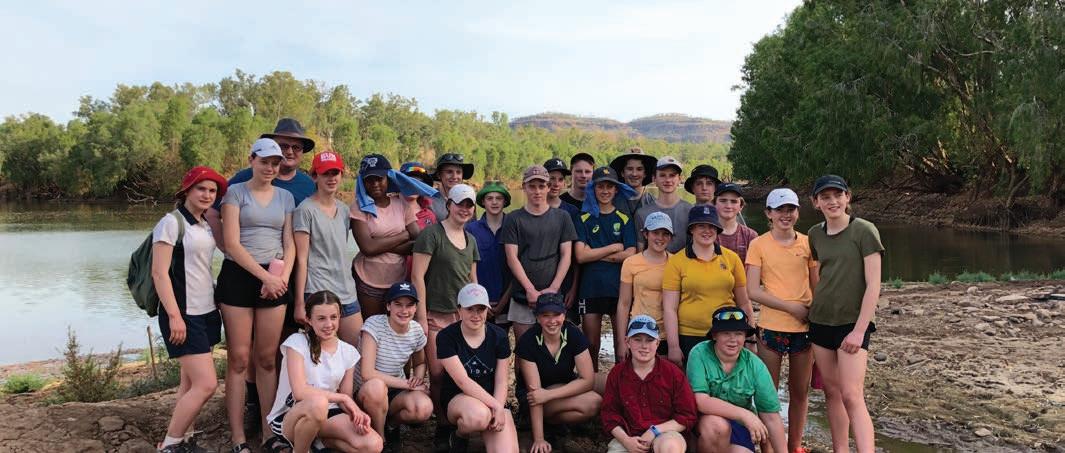
The Canteen is available to Junior School students for lunch orders only. Orders should be completed using the FlexiSchools App. Lunch orders are collected each day and delivered to classrooms by student helpers
It is of assistance to teachers if they are made aware, in good time, of any circumstances in the home which produce interruption to the normal routine – eg accident, illness, absence of a member of the family, parental separation or the death of a family member or close friend. This enables teachers to understand any changes, subtle or obvious, which have taken place in a child’s behaviour or performance.
Ballarat Grammar is a Christian School in the Anglican tradition. All Junior School children attend a service of worship in the Chapel of St Mark each week. The School expects that all children attend Chapel services. Special services for Mother’s Day and Father’s Day are highlights of the Junior School year and a Christmas Service is held as the final celebration of Term 4. Parents are welcome to attend these services.
Each year the Bishop conducts a Confirmation Service. Those students wishing to be confirmed should speak to the Chaplain.
All students in the Junior School take part in weekly Life and Faith lessons led by the Life and Faith teacher.
Children are instructed in the Eucharist and have the opportunity to receive the Eucharist at the appropriate services. Children who have been admitted to the Eucharist in other faiths are also welcome to take the Eucharist at Junior School and Grammar services.
Classroom Helpers are an integral component of our school programs. We are fortunate to have a fantastic ‘bank’ of trained Classroom Helpers and are always keen for more. A Classroom Helpers Training Course is held during Term 1 of each year to assist volunteers with the protocols involved in this important role. A rotating timetable of helpers is prepared for Terms 2, 3 and 4 with the Prep – 4 classrooms being our target area whilst also including opportunities to help in Years 5 & 6.
Classroom Helpers contribute in a variety of ways, both inside and outside of the classroom environment. Help is not only sought in the English and Mathematics areas. Excursions, sporting events, After School Sports and Arts and working bees are all areas where our wonderful group of helpers provide invaluable assistance.
Junior School classes operate from 8:45am to 3:25pm. There is a teacher presence in the playground from 8:15am to 8:45am and between 3:25pm and 4:00pm. It is recommended that students arrive at the School no later than 8:35am, to give them time to unpack, meet their friends and generally prepare themselves for the day.
8:30am - Teachers welcome children and provide supervision in classrooms as students arrive to prepare for the day.
8:50am - Period 1 begins.
9:45am - Period 2 begins.
10:55am - Recess – children go outside to eat morning tea and play. Supervision is provided by Junior School teachers situated around the yard.
11:15am - The middle session of classes begins - this includes Periods 3 and 4.
1:15pm - Lunch time – children are provided with ten minutes to sit down and eat their lunch. Food ordered from the Canteen arrives at this time.
1:25pm - Lunch play – children go outside to play. Supervision is provided by a variety of Junior School teachers situated around the yard.
2:15pm - The final session of classes - this includes Period 5.
3:25pm - Dismissal.
NB: At the end of the day students are to be collected by 4:00pm at the latest, unless participating in Out of School Hours Care or After School Activities. If there is any confusion regarding travel arrangements, students need to report to the Junior School Office.
The Junior School has an open enrolment policy; any child may be enroled in classes where vacancies exist, provided that the School and the parents agree that this school is suitable for the child. The School expects that parents understand the ethos of the School and support the School
Enrolment enquiries are handled by the Admissions Office. Arrangements can be made for the parents of prospective students to meet with the Head of the Junior School. Enrolment information can be obtained by contacting the Admissions Office on 5338 0830 or please visit our website. Applications are accepted via an online application process.
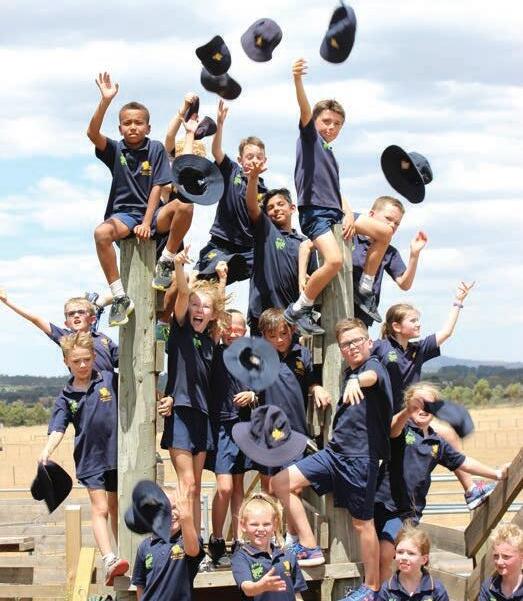
If a child is to be withdrawn from the School, one term’s written notice must be given to the Headmaster, headmaster@bgs.vic. edu.au , otherwise one fourth of the total annual account will be charged. In instances of sudden withdrawal through unforeseen circumstances, the Headmaster should be consulted. Early notification is always helpful for both the family and the School.
Parents are requested to advise the School promptly of any changes to the information held by the School about their children. It is essential that the School be informed of any changes of address, telephone number and medical requirements.
Essential Agreements are a powerful way of bringing out the best in individuals, small groups, year levels and entire schools. They are a collection of positively framed statements devised by those who will be directly affected by them. As Ballarat Grammar has adopted the IB PYP, each class or year level begins the year by writing their own class Essential Agreements. They need to be:
•Few in number
•Written by all group members
•Applicable to a broad range of situations
•Understood by all group members
•Agreed on by all group members
•Positively framed
An easy way to get clear, concise and powerful Essential Agreements is to begin by imagining the ideal learning space, or on a personal level, how do you learn best or be your best? What would the learning space look like? What would happen here? What do the students do? How do they act? How do they interact with each other? How do they interact with the teacher?
Using this initial discussion as a basis, it is an easy step to continue the conversation towards personal actions. How can we ensure the learning space is the best it can be? What can we agree on to bring out our best? What can we aspire to achieve?
The power of Essential Agreements is that they are not prescribed by the teacher; the students have agreed to abide by this group devised document. For our students, referring back to essential agreements can quickly bring focus and give space to reflect on their actions and how they can improve. In addition, students can work towards specific sections of the Essential Agreement such as commitment to learning, clear communication, enthusiastic participation, taking personal learning risks etc.
The School’s Business Notice, which is made available to all parents, outlines the financial arrangements operative within the School. All questions relating to financial matters, including fees insurance, conveyance allowance and other government allowances and assistance programs should be referred to the Administration Office (Phone 5338 0700).
The Grammar Foundation operates a Fees Trust, which provides for payment of school fees on the death or permanent disablement of the fee-paying parent.
The protection also provides for fee refunds where a student is absent from school for more than two consecutive weeks because of illness or accident. Full details are available in a separate proposal form. This cover is charged at a flat rate of 2.5% of total fees and is highly recommended. For further information concerning the Fees Insurance Trust, apply to the Business Manager.
Parents who are eligible for this allowance must contact the Administration Office for the appropriate form.
Eligibility for Education Maintenance Allowance is dependent on the parent holding a current Commonwealth Health Card. Completed forms must be received by the Business Manager prior to the first week of Term 1 and the first day of Term 3.
Applications need to be made in each year that a parent is eligible.
Ministry of Education application forms may be obtained from the Administration Office. An Allowance for Conveyance form needs to be completed each year.
If you or a close family member have special expertise in something and would be prepared to visit a classroom, please let us know so that we can make use of your knowledge should it be relevant to our classroom program.
If a student becomes ill or sustains an injury during the day, he/ she will be taken to the School Health Centre for treatment. A school nurse is in attendance at all times.
The Health Centre hours are 8:30am – 5:30pm Monday to Thursday and 8:30am – 4:00pm on Friday.
Minor treatment of headaches, cuts and abrasions etc. will be dealt with in the Junior School Sick Bay.
A School Entry Immunisation Certificate is a specific document which shows your child’s record of immunisation. The certificate is an important record that will assist health authorities in protecting children in the event of a vaccine preventable disease occurrence in school. Please note that it is a legal requirement to provide a School Entry Immunisation Certificate on enrolment to primary school in Victoria. There are two ways parents can obtain this certificate:
•Parents will automatically receive a history statement from the Australian Childhood Immunisation Register (ACIR) after your child has completed the four year old vaccine schedule and has completed all childhood immunisations required. On the bottom of the page it should state: “This child has received all vaccines required by five years of age”.
•Parents whose child’s immunisation records are incomplete, missing or in cases where the child has never been vaccinated, should contact their local council immunisation service who will be able to assist in obtaining a School Entry Immunisation Certificate. For more information about how to obtain this certificate please contact your local council immunisation service or visit www.health.vic.gov.au/immunisation under the heading ‘frequently asked questions’.
There are common infectious diseases, including mumps and measles, for which it is necessary to exclude the patient from school. Information about these matters is available from teachers, from the Junior School Office d from the Health Centre.
In the Junior School, a small amount of home learning is set each week with the ethos being to progressively develop sound study habits. Reading and responding to reading is the most significant component of home learning from Years Prep to 6. The platform used to respond to reading may vary from time to time. This approach to home learning demonstrates how much we value reading at Ballarat Grammar as we strive to develop a strong reading culture in the School.
We believe that home learning should not be such that children and parents are “in dispute” of an evening. We realise that children and families lead busy lives and that children are, generally, engaged in a wide range of “after school” activities. A balanced and supportive approach can provide the basis for enhanced student outcomes in terms of skill development and positive habits of study and learning. Where difficulties arise, please liaise directly with your child’s class teacher.
In Prep to Year 2, home learning is all reading and responding to reading (recording in writing some reflection about the reading). Other take home activities may be explored from time to time but will be seen as fun rather than ‘work’ – and this may be offered at any year level.
In Years 3 to 6, home learning consists of:
•Reading and Responding
•A weekly/fortnightly number facts challenge
•A weekly/fortnightly word study challenge
Both sets of challenges are drawn from a bank of options that teachers set. In Year 6, during Term 3, as children prepare for Exhibition, the weekly/fortnightly challenges will be set aside to allow for research.
Children should not be allowed or forced to struggle with home learning which they find too difficult, or which is excessive in quantity. It is impossible for teachers to determine the exact time which will be required for the completion of a particular task by each child in a class, and thus discretion must be exercised where necessary. If problems arise with home learning please speak with your child’s teacher or write an appropriate note in the Planner or send via email.
As a rough guide, the School regards the following times as being appropriate:
Prep: Reading/Sounds up to 10 minutes each night, as a general “rule of thumb”.
Year 1:
Year 2:
Year 3:
Year 4:
Year 5:
Year 6:
10 minutes each night
15 minutes each night
15 minutes each night
20 minutes each night
20 minutes each night
30 minutes each night
If problems arise with home learning please speak with your child’s teacher or write an appropriate note in the planner.
There are four Houses in the Junior School:
Allen House: honouring the former Bursar of the School, Mr K W L Allen. The colour for Allen House is Gold.
Brown House: honouring Mr I C Brown, Headmaster of the Junior School from 1963 to 1977. The colour for Brown House is Red.
Dewhurst House: honouring Mrs M A Dewhurst, formerly a primary teacher at Ballarat Grammar. The colour for Dewhurst House is Blue.
Graham House: honouring Miss M Graham, a former teacher at the Junior School who served the School for 33 years, retiring at the end of 2008. The colour for Graham House is dark (bottle) green.
During 2014, the School opened a new facility at the Mount Rowan campus, known as the Stephen and Sue Higgs Centre, with a particular focus on the learning needs of Year 4 students. The Mount Rowan Campus experience is an innovative model that promotes a deep respect and appreciation for the natural world through ‘caring for life’. Set away from the rest of the Ballarat Grammar Junior School, students are immersed in a place-based learning program that not only fosters academic learning, but also cultivates the emotional, social, spiritual and ecological dimensions of life. The curriculum at Mount Rowan enables students to not only connect with their local environment, but also deepen their understanding of community – human and otherwise. Students will be immersed in rich learning experiences that have been carefully linked to the Australian Curriculum and the IB PYP. The surrounding LearnSCAPE acts as a springboard for explicit teaching of skills in the core academic subject areas. The curriculum aims to maximise the restorative value of the environment and the relationships that it shares with wellbeing and cognition. The students utilise this learning in all aspects of their lives on the campus. The building incorporates natural ventilation, light, colours and extensive views, and the LearnSCAPE provides a diverse and rich resource to support student growth.
Parents are encouraged to consider enrolling their children in instrumental and/or speech art lessons. Information regarding the enrolment process is available through the Music Office.
For Prep to Year 2 students, private tuition should occur at times other than Periods 1 and 2 to avoid young students missing targeted literacy and numeracy learning. Instrumental and classroom teachers work together to ensure that children attend their private lesson at the most appropriate time, generally on a rotational basis.
It is preferred that Prep students commence private lessons from Term 2, allowing them time to settle in; however, parents should enrol their child for lessons as soon as possible, for timetabling purposes. Instrumental teachers will contact parents to discuss commencement.
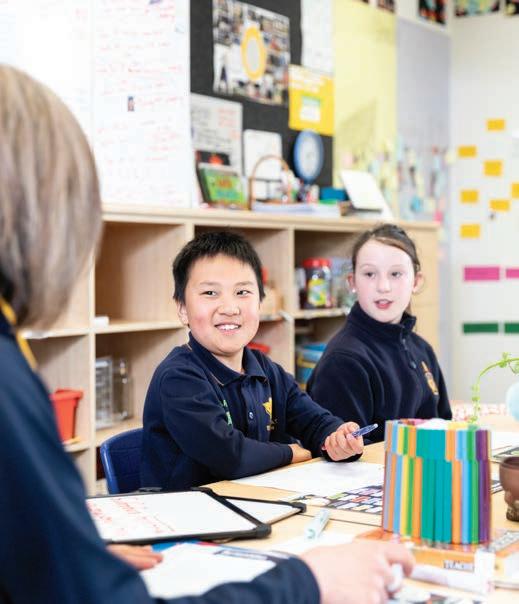
All private lessons are of 30 minutes duration. Shared lessons may be possible for some instruments/speech art lessons. Instrumental teachers will endeavour to accommodate requests for out of school lessons, but this is not always possible as VCE students are given priority.
Parents should carefully consider the choice of instrument for their child. Any student wishing to undertake piano lessons should have access to a piano or keyboard at home. Violin, viola and recorder may prove more appropriate for younger students.
Brass instruments such as trumpet, trombone or euphonium and woodwind instruments such as flute, clarinet and saxophone are generally not suitable for children aged Prep to Year 2. For advice regarding suitable instrument choices please contact the Music School office on 5338 0879.
A Junior School Newsletter is published each Friday and may be downloaded from Nexus online or the Nexus App. User names and passwords will be provided to parents for access.
The Newsletter contains important news and dates. Please take the time to read it carefully, as important information and notices are always included
NEXUS
NEXUS is an online learning management and communications tool which is used by staff and students to facilitate the learning across all subject areas, as well as to aid in communications between the School and parents.
It operates both online in an internet browser and on mobile devices as an Application (App), both of which look quite different, but contain all the same information.
NEXUS is used for:
•Communication between school, students and parents about student learning and homework
•Important Notices relevant to your child (eg. what to bring today, excursions etc)
•General News (general school news, including messages from the Heads of School and Newsletters)
•Sports, Music, Calendar Events and Community News
•Junior, Middle and Senior School Class Pages
•Handy Forms (eg: camp forms) and School Policies
•Details on the Uniform Shop and Canteen
•Making contact with the School
Nexus can be accessed in two ways – online at https://nexus. bgs.vic.edu.au or by downloading the app for your Smartphone. Search for Ballarat Grammar on the Apple App Store and Google Play Store.
To log in to NEXUS, use your School ID Number as your username and your Ballarat Grammar password that you would have been provided when your first child started at the school. If you don’t know your school ID Number please email nexus@bgs.vic.edu.au and we will forward you this information.
Parents are automatically registered to receive notifications for the whole school, relevant campus and relevant Year Level News items. To receive notifications regarding other sections in the school (Sports teams) just click on the Join Groups link in the side menu once you have logged in. From here select the Groups you wish to be notified information about that apply to your student (Year 7 Basketball, Senior Boys’ Rowing) and click on Join Selected Groups. To remove yourself from any groups, untick the Groups you no longer wish to be part of and again click Join Selected Groups. This will remove you from these optional groups.
To access documents for parents, log in to Nexus online. All documentation relevant for parents at a whole school level can be found on the Documents for Parents page which can be found by clicking on this tile on your main dashboard.
If you need any support, please send your questions issues or feedback through to nexus@bgs.vic.edu.au and the Nexus team will respond as soon as they can.
Ballarat Grammar is a nut-free campus. Please ensure families and students do not bring any item containing nuts onto school grounds.
The Junior School Office is open between 8:15am and 4:30pm each school day.
The direct line to the Junior School is 5338 0846. If the office is not staffed or the line is engaged, please leave a message on the message bank or contact the Senior School receptionist on (03) 5338 0700. Emails can be sent to js@bgs.vic.edu.au
Most students new to the School commence at the beginning of first term. An Orientation Day is held in early December to give students the opportunity to spend a day in class with other class members. For children in Year 6, this involves spending a day in the Middle School, enjoying aspects of Year 7 life. Children undergoing transition within the School are also assisted in that process on this day.
Children are welcome to spend a day in the prospective year level, to ease the transition into the Junior School. This has proven a successful method of introduction to the Junior School. The orientation and effective transition of students into the School is facilitated by prospective parents fully advising the School of any academic or social needs which the child may have.
A Parent Information Evening will be held during Term 1 each year and discuss the staffing line up and the year ahead.
A volunteer from each class is requested to welcome new families, organise a couple of social events and to attend one meeting per term.
Every child is issued with a Study Planner. This planner is one of our means of communication between the School and home. Its use compliments other communication methods such as email, NEXUS, telephone messages and meetings. Home learning details are either entered in the Planner or posted on Nexus. Please check, and sign, your child’s Study Planner weekly, so that it is established and maintained as an ongoing means of communication. The Planner will be checked regularly and signed by your child’s teacher.
Preparatory students vary in how quickly they adapt to new settings, routines and faces as they begin at the Junior School. In recognition of this, we provide a full-time classroom program from the first day of school, with flexibility should children tire or find the emotional demands difficult in the first few weeks. It may be necessary to reduce your child’s timetable during this period, by finishing the school day at lunch time on selected days Your child’s teacher may recommend this, or you may identify this need from your own observations and bring it to the teacher’s attention.
It is important during this period that your child’s experience of school is a positive one, and you are the best judge of your child’s physical and emotional state, so if you feel that your child needs an afternoon or day off to relax, please use your discretion.
Drop off
Parents are able to drop students off in the drive through drop off in Dare Street, or park nearby and walk their children to the gate.
Transitioning
Your child’s Kinder teacher will be invited to visit your child in their new class setting early in the year. This is a good opportunity for children to develop an awareness of how they have grown in independence and confidence since Kindergarten.
Supervision and support
Junior School children are supervised by a range of Junior School staff at recess and lunch breaks, which is a change from the constant supervision by a small number of staff in the Kindergarten setting. Thus, classroom teachers supervise Prep students in a restricted area of the Junior School playground during the settling-in period, and Junior School teachers from other year levels are encouraged to make brief visits to Prep classrooms in which they can be introduced and become familiar faces.
Year 6 buddies support Prep students informally in the playground and make more formal visits to Prep classrooms to read with children during first term.
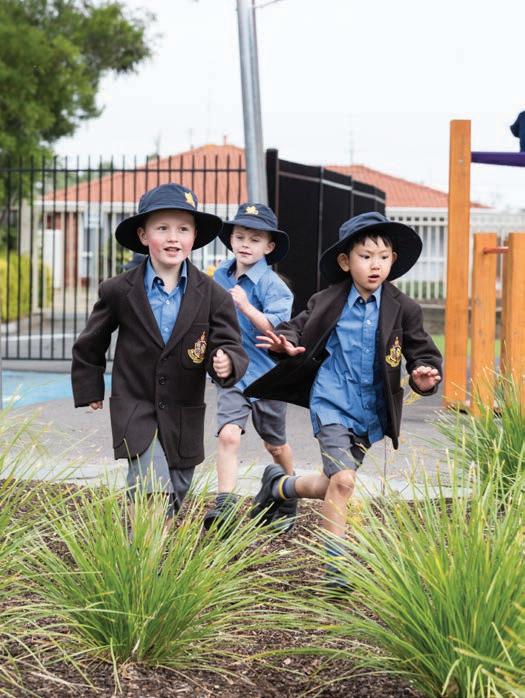
Literacy: Sharing fabulous books with your child in a comfortable place and talking about what you have read gives them a great start in reading. Pretending to read by telling a story based on the pictures is a legitimate pre- reading behaviour and which can be acknowledged and encouraged. In order to read print, children first need to understand that we always move from left to right along a line of words, and that each written word corresponds to a spoken word – pointing to the words as you read will help your child to establish these understandings.
Children need lots of activities to strengthen and develop the small muscles in their hands and fingers before they are ready to write letters, numbers and words. It is important that they are encouraged to use a correct pencil grip at all times – even when drawing - as this supports precision in forming letters and numbers. If your child is interested in writing, please help them to use lower case and capital letters in the appropriate places. Activities that help to develop the fine-motor skills necessary for writing are: drawing, painting, using play dough, using paper clips to make chains, picking up toothpicks, cutting with scissors, playing with Lego and jigsaw puzzles and threading beads.
Numeracy: Developing number sense begins with learning the counting sequence and then applying it to a collection of objects. Children need to establish an understanding that each object to be counted corresponds to a single number in the counting sequence, and this requires plenty of practice. Please look out for opportunities for your child to count, such as finding out how many apples are in the bag, counting out the ingredients required for a recipe or counting pairs of socks when packing for a holiday.
Each day, each Prep student should bring a "healthy snack” in a separate container to eat at the end of Period 1, while they work. Please ensure that this is neat finger-food which your child can realistically eat whilst completing their work. Sticky or juicy snacks, or those requiring spoons, are more appropriate for morning tea or lunch. Dried fruits are high in sugar and stick to teeth so it is best that the mid-morning snack is fresh.
The following are good examples:
• Small fruits such as grapes, strawberries and cherry tomatoes;
• Simple fruits such as bananas and apples;
• Salad ingredients including carrot sticks, cucumber sticks or discs, snow peas.
• Chopped fruit in a container with a small fork or toothpick to prevent sticky fingers.
In December 1996 at the Annual Round Square Conference in Nairobi, Kenya, a delegation of students, staff and Board of Directors of Ballarat Grammar accepted membership of The Round Square on behalf of the School.
The Round Square is a group of some 180 schools in 50 countries which share a commitment to the educational principles of Dr Kurt Hahn (1886-1974).
Kurt Hahn was a remarkable educator who founded Salem School in Germany to develop young people whose convictions would be rooted in personal responsibility, kindness and justice. Such ideals were in direct conflict with the rise of Fascism and Nazism in Germany in the 1930s and Hahn was forced to escape to England where he founded Gordonstoun School in 1934. Hahn saw the entire program of a school – curriculum, daily routines, disciplines, social life, co-curricular activities – as merely a vehicle through which young people could be trained to take charge of their lives, raise their sights and grasp the central principles of democratic life. As such, the central goal of first Salem and then Gordonstoun was not simply to “prepare” students for tertiary study or work but also to prepare them for life by facing life directly, in ways that would demand courage, generosity, imagination, principle and resolution. Students were not only expected to do well in conventional ways but also to serve and to lead.
By the 1960s, there were schools in Europe pursuing the educational ideals of Kurt Hahn. Regular meetings were held and in 1967 it was suggested that the group form an organisation called The Hahn Schools. Hahn vigorously opposed the idea of calling the organisation after himself. The organisation decided to call itself after the building at Gordonstoun in which its founders met – “Round Square”.
Schools of the Round Square, while at first glance appearing quite dissimilar, all share consistent principles and priorities. These are the five “pillars” of The Round Square:
•Students devote substantial time and energy to service of others.
•Students’ leadership roles are substantial and kindness towards others within the school community matters.
•Students are challenged and powerfully engaged by outdoor activities, which promote personal development.
•Students are asked to look beyond gender, class, race, nationality and culture to understand the common values between people.
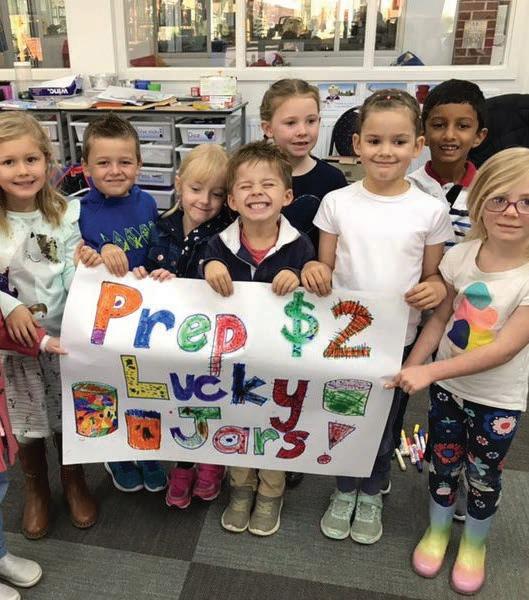
•Students are encouraged through projects, programs and curricula to see their destiny as caretakers of society and the environment.
I International awareness
D Democracy
E Environmentalism
A Adventure
L Leadership
S Service
Activities at Ballarat Grammar Junior School promote Round Square IDEALS in many ways and all students can, and should, be involved. 2013 saw the introduction of a Junior School Round Square Committee who co-ordinate Round Square in the Junior School, liaise with Senior School Round Square Captains and have the opportunity to attend the annual Young Round Square Conference held at various venues throughout Australia.
A regulation School bag is required. This is available from uniform suppliers. School bags should be named on the outside, so that children hastily picking up bags can be sure of taking their own bag home. A small bag tag or label with the child’s name has proven successful at helping students keep track of their own bag.
Each student should bring to school the following items in their School Bag:
•Drink: A clearly labelled bottle containing water only.
•Food: A clearly labelled lunch box or bag with food for fruit snack, morning tea and lunch OR a clearly labelled lunch box or bag with food for morning tea and a lunch order (see Canteen section).
PLEASE NOTE: Highly allergenic foods such as nuts, nut-based spreads, and pure egg (boiled, or in sandwiches) are not suitable for school lunches. We encourage “Nude Food” to reduce waste, so please consider how you can minimise the use of disposable wrappings and packaging. Our Canteen supports us in this, and allows children to send re-usable containers to the canteen when they have a lunch order.
•Satchel: This will contain any notices or work sent home each day, and should be used to transport home reading practice books and the Study Planner.
•Spare Clothes: Sometimes children need to change out of soiled, wet or muddy clothes at school. If this is likely to happen to your child, they will feel more comfortable if they have their own set of clothes – or at least their own underwear – in their bag for these situations. We encourage all Prep students to do this in the beginning; as the year progresses you may use your own discretion to decide whether it continues to be necessary. Please ensure all clothing is clearly labeled!
• Scarves, Beanies and Gloves: In colder weather, please ensure that your child has extra layers of the school uniform to put on when they go outside to play or participate in sport.
The Ballarat Grammar Shop is located at 212 Forest Street, beside Gate D. The Shop sells new and good-quality second hand uniform requirements and some stationery items
The Shop is open Monday to Friday between 8:30am-11:30am and 1:00pm–4:00pm during term time. Appointments for new students to be fitted for their uniforms will be available throughout November, December and in January. Appointments can be made by contacting the Shop on 5338 0867 or shop@bgs.vic.edu.au.
Also available:
• Hair accessories: Ribbons, clips and elastics should be navy, gold or ivory in colour
• Drink bottles
• Sports gear such as swimming goggles and mouth guards
• School hats, beanies, scarf, gloves and tights
Each term, the children of the Junior School undertake social service activities aimed at assisting people less fortunate than themselves. Their efforts are directed locally, nationally and internationally. Through the Ryder- Cheshire Foundation, they began sponsoring an Indian girl, Bina, in 1978. Each year the students run a Bina Day Festival during which they raise the funds necessary to maintain sponsorship. We are now working with Ryder Cheshire to further expand our community service activities in East Timor, through the Klibur Domin Hospital.
The School Community, Staff and the Year 6 Service, Wellbeing and Round Square Committees combine to raise money and awareness for many worthy causes.
When there is a day with a high UV factor, a “hats on” policy applies. Children playing in the open must wear hats on these days, or must remain in the shade.
Sunscreen should be applied at home in the mornings however additional sunscreen will be encouraged for PE lessons and outside activities School hats are available from the School Shop. Students in Years 5 and 6 may wear school caps but should be encouraged to wear the hats because of the improved sun protection provided by the full brim.
The Friends of Ballarat Grammar support group meets regularly in support of the School and its students. The School encourages parents to take as active a role as possible, and we welcome all contributions to our School. Details of meetings and functions are published regularly in the Junior School Newsletter or on NEXUS or social media pages
Students in the Junior School are not permitted to have a mobile phone or connected smart watch on them during school hours. Students may contact parents via their classroom teachers or the Junior School office if required.
To make our school precincts a safe environment for children, we have the following recommendations:
• Dare St is at its busiest at drop off and pick up times.
• We utilise what we call the 'drive through drop-off' in Dare street in the mornings, a calmly-flowing drop-off point where families can pull up their cars for their children to get out and head to their classroom after a quick goodbye.
• Please do not “park” or “idle” on the left side of Dare Street in the morning or afteroon in the hope of a space becoming available. We encourage you to keep traffic moving to avoid congestion and dangerous situations for students and families.
• Please park in Shaw Avenue or Lake St (only a short walk) whenever possible to avoid the crush in Dare St.
• Families can use the Norman St 'laneway' driveway and drop off or park near the Rintel Centre
• Please always follow the road rules and parking laws, respect our neighbours and community members, and do not park in Disabled or Taxi spaces unless you are permitted to do so Your co-operation is vital in ensuring the safety and well-being of our whole community and we thank you for your patience during drop off and pick up times.
For their own safety, children waiting for buses, or to be picked up by car after school in Dare Street or Forest Street, are instructed to wait inside the School grounds until their parent or guardian arrives.
Students must be collected at the gate and not be encouraged to wander onto footpaths by themselves Staff members are on duty at both Dare Street and the Rintel Centre until 4:00pm each day. Children who miss their buses, or who have not been picked up as arranged, are to report to the Junior School Reception team who will phone parents or guardians for further instructions.
Students still waiting for collection after 4.00pm will be cared for in the Out of School Hours Care (OHSC) centre. The normal OSHC fee will be charged for this service.
Under no circumstances will children be allowed to leave the campus unaccompanied, or in the company of adults, other than parents or guardians, unless a note from the parent is received by the Class Teacher.
Camp Australia operates an authorised Outside School Hours Care (OSHC) Vacation Care Program for up to seven weeks per year. Care is offered between 8:30am and 6:00pm each day of the nominated weeks in the Junior School Arts Centre.
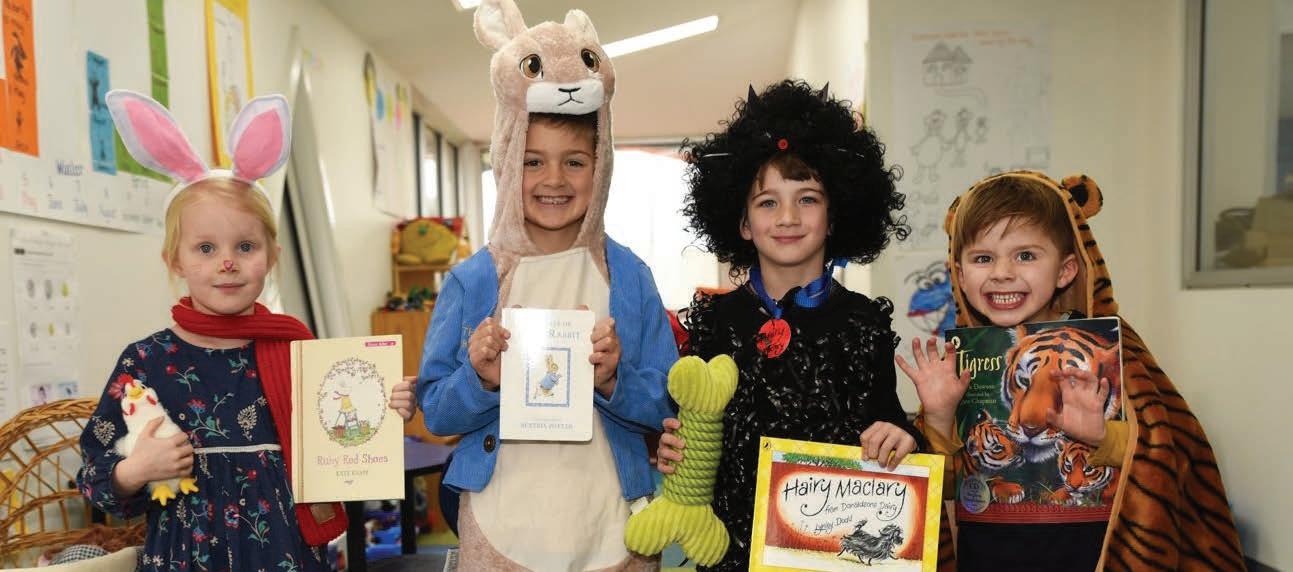
Government rebates may be available to parents. Information regarding the dates of the program and the activities being offered may be obtained from the Junior School Office.
If necessary, a decision to cancel after school sport will be made as early as possible. Such a decision is always made in the best interests of the students and families concerned. Parents are asked to telephone the Junior School (5338 0846) or check Nexus notifications to ascertain whether sport has been cancelled.
•Dress - the required length is to the knee, OR Blue shirt and shorts.
•Blazer - is required to be worn to and from school each day.
•Black closed-front leather lace-up shoes. Velcro acceptable for Prep to Year 2 students. NO Buckles.
•White ankle socks.
•Jumper.
•Bucket hat – compulsory for Prep-4 students. Bucket hat or Cap for Yrs 5 and 6.
•Pinafore OR Kilt OR Navy Pants - Pinafore is only available up to a child’s size 10.
•Cream blouse.
•Tie.
•Jumper.
•Blazer - Is required to be worn to and from school each day.
•Navy tights or navy knee high socks.
•Black closed-front leather lace-up shoes. Velcro acceptable for Prep-2 students. NO Buckles.
•Gloves (optional).
•Scarf (optional).
•Beanie (optional) for outdoor winter wear only.
•Blue short sleeve shirt.
•Grey shorts.
• Jumper
•Blazer - to be worn to and from school each day.
•Grey BG long socks with striped top.
•Black closed front leather lace-up shoes. Velcro acceptable for Prep-2 students. NO Buckles.
• Bucket hat – compulsory for Prep-4 students. Bucket hat or Cap for Yrs 5 and 6.
•Grey trousers or grey shorts.
•Dark grey socks with trousers.
•Grey BG long socks with striped top to be worn with shorts.
•Black closed front leather lace-up shoes. Velcro acceptable for Prep-2 students. NO Buckles.
•Cream long sleeve shirt.
•Tie.
• Jumper.
•Blazer - to be worn to and from school each day.
• Beanie (optional) for outdoor winter wear only.
•Sport polo.
• Sport rugby top.
•Sport shorts.
• White sports socks.
• Runners with a non-marking sole.
• Sport navy jacket or spray jacket (optional)
• Bathers.
• Navy BG fleece track pants, Yrs 5 & 6 have the option of fleece or microfibre.
• Sport bag (if required).
• BG House polo top - (not compulsory).
• Bucket hat – compulsory for Prep-4 students. Bucket hat or Cap for Yrs 5 and 6.
•Approved polo shirt with Frog and BG logos.
•Approved long sleeve fleece with Frog and BG logos.
•Bucket hat (compulsory).
•Navy fleece track pants.
•Navy socks.
There may be a small number of other Mount Rowan specific items such as gum boots and beanies which will be outlined to parents before the year begins.